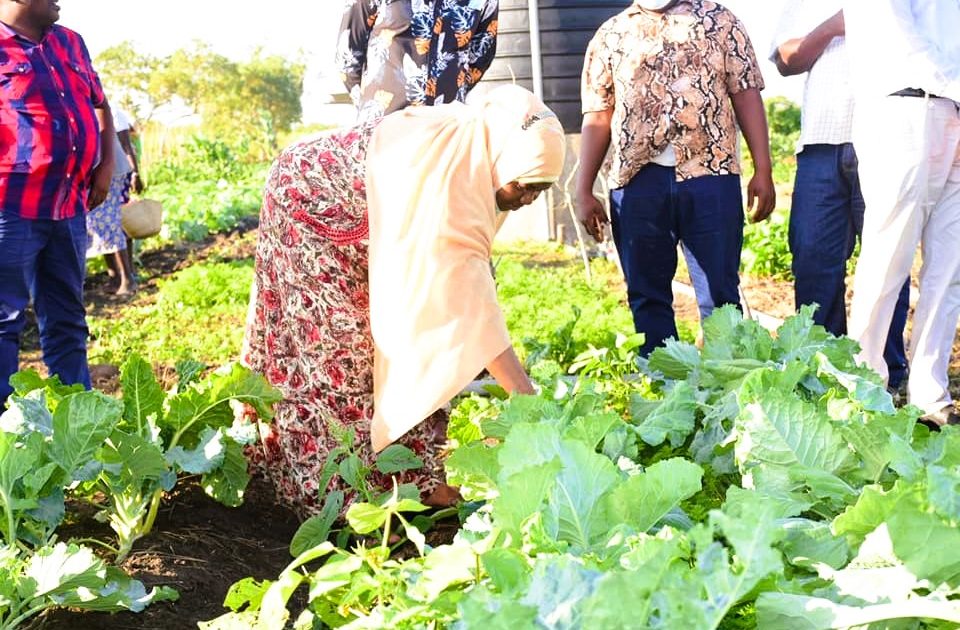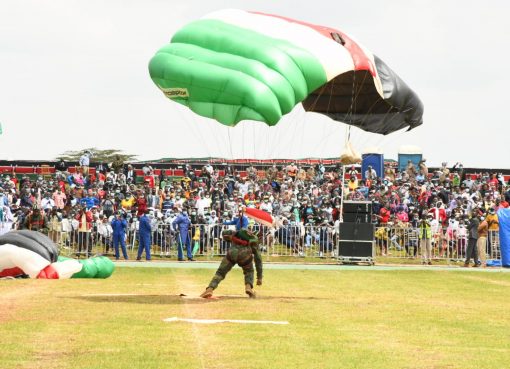Kwale county government is focusing on year-round farming through small-scale irrigation schemes to boost agricultural productivity, food security and rural livelihoods.
More than 4,000 smallholder farmers have been incorporated into this program through a partnership between the County Government of Kwale and the National Agricultural Value Chain Development Project (NAVCDP).
The coastal county’s main sources of water are boreholes, underground springs, dams, water pans and rock catchments.
Governor Fatuma Achani says the agricultural irrigation support initiative is aimed at enhancing food security, supporting livelihoods and promoting economic growth in the coastal county.
Governor Achani says the devolved government seeks to promote year-round agriculture, production, and farming by embracing irrigation during the dry seasons.
“By investing in irrigation infrastructure and technology, we expect to achieve greater food security, reduce poverty and create employment opportunities for our people,” she said.
Over 25 mega- and medium-sized dams with components of small-scale irrigation schemes have been constructed across the region providing a reliable water supply to smallholder farmers.
The dams serving as reservoirs to store water for agricultural use and water for livestock include Nyalani, Mwena, Silaloni, Mwaluvuno, Kizingo, and Mwakalanga.
The dams are serving as a catalyst for modern irrigation farming, reducing dependency on rain-fed agriculture, and promoting agribusiness development.
Achani says Kwale has prioritized sustainable agriculture in its dry zones in Lunga Lunga and Kinango subcounties by spearheading a bold initiative that has seen 250 acres of land placed under drip irrigation.
“With the irrigation schemes arid and semi-arid areas have the potential to transform from a basket case struggling with food security issues to becoming food barns,” she said, adding that Kwale is dedicated to economic growth through agricultural transformation.
Achani said the county is undertaking several irrigation projects designed as a ‘ladder out of poverty’ for the smallholder farmers in areas endowed with sufficient water resources for irrigation-based intensification.
She stated that the county is providing direct support to farmers by distributing certified seeds, improved varieties of crops, fertilizers, and irrigation equipment.
Achani emphasized the critical need for a climate-resilient agricultural system to counteract the increasing threats from erratic weather, droughts, and emerging pests and diseases.
The county boss has reiterated the devolved government’s commitment to expanding irrigation infrastructure and access to sustainable water reservoirs particularly to arid and semi-arid areas prone to drought.
“The dams and the irrigation projects play a critical role in building resilience to climate-induced changes and making all year-round production and cultivation possible,” said Achani.
She also emphasized the need for mechanization of agriculture noting that her administration has provided tractors and other critical equipment to farmers to enhance productivity and underscored the significance of technology adoption in agricultural advancement.
Achani, who was accompanied by the County Executive Committee Member (CECM) for Agriculture, Roman Shera, reaffirmed her administration’s commitment to supporting farmers and ensuring a prosperous and food-secure region.
She said they have also started distributing high quality seeds and fertilizers to local farmers across the 20 administrative wards ahead of the long rain season to improve yields.
The Governor says the devolved government has also launched solar powered water schemes in rural areas to enable residents’ access to clean potable water for domestic and agricultural use through irrigation.
Achani says the solar-powered water projects will increase access to safe drinking water, improve hygiene and basic sanitation across the coastal county.
County Agriculture Executive Roman Shera says agriculture is particularly hard hit by climate change such as droughts, floods and soil degradation which has a direct impact on agricultural production.
“Reliance on rain-fed and subsistence farming practices is no longer tenable and what we need is to embrace climate-resilient crops and farming techniques to ensure food affordability and sufficiency,” he said.
Shera says agriculture must adapt effectively to the new climatic conditions such as making irrigation more efficient, diversifying cultivation systems and selecting drought-resistant species or varieties that are more suitable for a particular region.
Farmers interviewed said rain-fed agriculture is not meeting demand for all year-round farming activities and welcomed the irrigation initiatives that aim to boost productivity, enhance cropping intensity, and expand production areas.
Esther Uchi, a farmer’s representative from Kinango Sub County hailed the county government’s focus on year-round farming ensuring cultivation during both the rainy and dry seasons to maximize food production.
Uchi says local farmers are shifting from single-season farming to all-year-round farming by embracing irrigation during the dry season, noting that rain-fed farming was highly unsustainable and extremely vulnerable to climate change.
“Since we got the irrigation water projects in Kasemeni ward farmers have now begun to grow spinach, eggplant, carrots, cabbages among many other crops, enough for domestic consumption and for sale,” she said.
She stressed the need to leverage dams, boreholes, springs and river basins in the coastal county to ensure year-round farming activities for agricultural production and food self-sufficiency.
Uchi said the impact of climate change on smallholder farmers has hitherto been profound, leading to decreased crop yields given their overreliance on rain-fed agriculture for sustenance.
By Hussein Abdullahi





